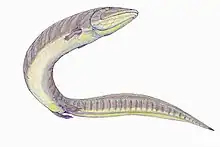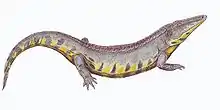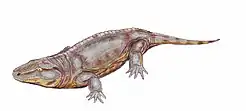| Bystrowiana Temporal range: Lopingian to Early Triassic | |
|---|---|
 | |
| Bystrowiana permira | |
| Scientific classification | |
| Domain: | Eukaryota |
| Kingdom: | Animalia |
| Phylum: | Chordata |
| Clade: | Reptiliomorpha |
| Order: | †Chroniosuchia |
| Family: | †Bystrowianidae |
| Genus: | †Bystrowiana Vyushkov, 1957 |
| Species | |
Bystrowiana is an extinct genus of bystrowianid chroniosuchian from upper Permian deposits of Vladimir Region, Russia[1] and Jiyuan, China.[2] Chroniosuchians are often thought to be reptiliomorphs,[3] but some recent phylogenetic analyses suggest instead that they are stem-tetrapods.[4] The genus is named in honour of Dr. Alexey Bystrow, who was a Russian paleontologist. It was first named by Vyushkov in 1957 and the type species is Bystrowiana permira.[1] Two species—B. permira and B. sinica—are known.[5]
Bystrowiana is known from a 30 cm skull, which suggests it was a large animal, up to 2.5 m (8.2 ft) in total body length.[6]
References
- 1 2 V. K. Golubev (1998). "Narrow-armored Chroniosuchians (Amphibia, Anthracosauromorpha) from the Late Permian of Eastern Europe" (PDF). Paleontological Journal. 32 (3): 278–287.
- ↑ Young, C.C. (1979). "A new Late Permian fauna from Jiyuan, Honan". Vertebrata PalAsiatica. 17 (2): 99–113.
- ↑ Michael Buchwitz; Christian Foth; Ilja Kogan; Sebastian Voigt (2012). "On the use of osteoderm features in a phylogenetic approach on the internal relationships of the Chroniosuchia (Tetrapoda: Reptiliomorpha)". Palaeontology. 55 (3): 623–640. doi:10.1111/j.1475-4983.2012.01137.x.
- ↑ Laurin, M. (2010). How Vertebrates Left the Water. Berkeley, California, USA.: University of California Press. ISBN 978-0-520-26647-6.
- ↑ Florian Witzmann; Rainer R. Schoch; Michael W. Maisch (2008). "A relict basal tetrapod from Germany: first evidence of a Triassic chroniosuchian outside Russia" (PDF). Naturwissenschaften. 95 (1): 67–72. Bibcode:2008NW.....95...67W. doi:10.1007/s00114-007-0291-6. PMID 17653527. S2CID 8161364.
- ↑
This article is issued from Wikipedia. The text is licensed under Creative Commons - Attribution - Sharealike. Additional terms may apply for the media files.





